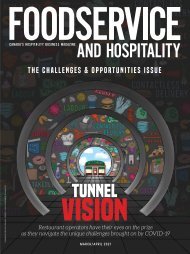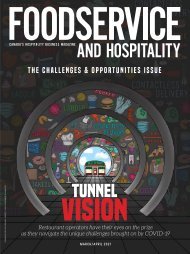October 2019 Digital Issue
Create successful ePaper yourself
Turn your PDF publications into a flip-book with our unique Google optimized e-Paper software.
Recent research from Chicago-based Technomic shows 62 per<br />
cent of diners are eating globally inspired cuisine at least once<br />
a month and demand is largely driven by younger diners.<br />
“Younger generations are generally driving demand for innovation,<br />
including global cuisines,” Anne Mills, senior manager of<br />
Consumer Insights at Technomic explains. “They’re more diverse<br />
and have had greater exposure to different cuisines from a younger<br />
age — thanks to the Internet — so they’re more open to trying<br />
new foods and flavours.”<br />
Ethics have become an important consideration when discussing<br />
globally inspired cuisine and many industry experts say<br />
we need to refer to it differently in a country as multicultural as<br />
Canada. Many within the industry are also concerned with issues<br />
surrounding cultural appropriation. Jo-Ann McArthur, president<br />
of Nourish Food Marketing in Toronto, says an entire generation<br />
of Canadians now exist who have never known anything other<br />
than multicultural restaurant offerings.<br />
“We aren’t using the term “ethnic” anymore — especially not<br />
in Toronto, where Generation Z has grown up with these types<br />
of international cuisines as staples in their lives,” she explains.<br />
“They’re just multi-cultural food offerings — a true reflection of<br />
Toronto as a city.”<br />
For those living outside Toronto, ethnic backgrounds vary<br />
considerably throughout Canada (First-Nations groups being<br />
considered the only true ethnic Canadians). Each ethnicity represented<br />
within Canada, as well as the distinct geography of each<br />
area, influences the food culture of that region.<br />
“What we’re seeing now [in globally inspired food trends] is<br />
more regional cuisine,” McArthur continues. “People don’t want<br />
‘Asian’ food anymore; they want to know what they eat in Taiwan.<br />
They’re going out for Vietnamese or Filipino food. There’s no<br />
blanket terminology anymore.”<br />
Arlene Stein, founder and executive director of Toronto’s<br />
Terroir Symposium, agrees the terminology needs to change<br />
around this cuisine.<br />
“Language is powerful and important in the way we<br />
frame things,” she says. “People are questioning why the differentiation<br />
of ‘ethnic’ to equate non-Western cuisines? By what<br />
we have learned and researched over the years, ‘ethnic’ is a racist<br />
term. By clinging to these [differentiations] we’re ignoring the<br />
FOODSERVICEANDHOSPITALITY.COM<br />
OCTOBER <strong>2019</strong> FOODSERVICE AND HOSPITALITY 17


















